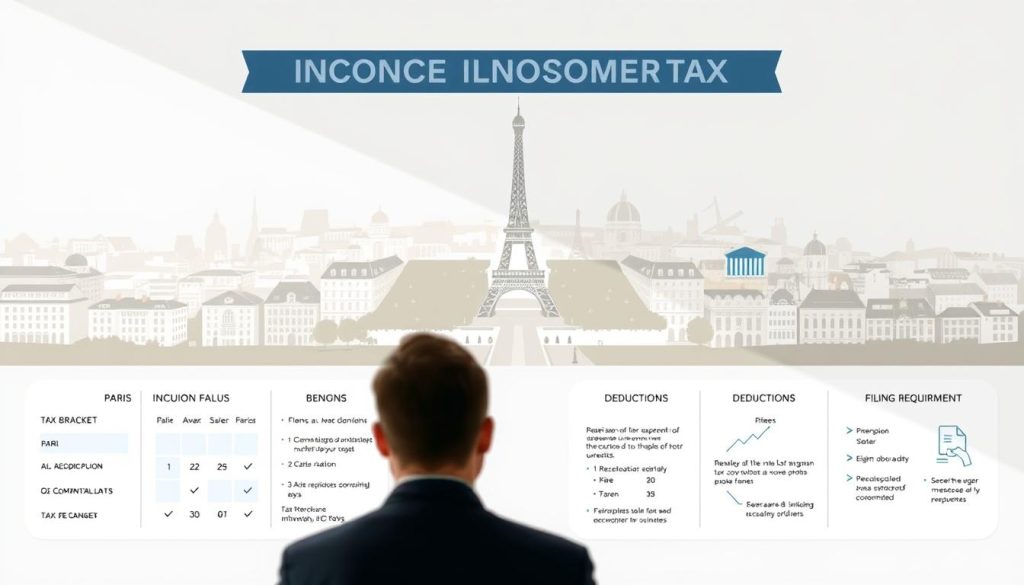Welcome to France! Moving to a new country is an exciting adventure. It also comes with new rules to learn, especially about your finances. We created this guide to make things easier for you.
Understanding the local system can feel overwhelming at first. You might worry about making mistakes. But with clear information, you can feel confident and secure.
This guide will walk you through the French financial landscape. We cover key details for Americans and international expats. You will learn about credits, deductions, and exemptions that may apply to your situation.
Our goal is to help you keep more of your hard-earned money. Whether you are employed, self-employed, or running a business, there are opportunities designed to support you.
We break down complex topics into simple, easy-to-understand language. You do not need to be a finance expert. By the end, you will have practical knowledge for your financial planning.
Table of Contents
Key Takeaways
- This guide simplifies the French financial system for newcomers.
- Clear information helps you feel more confident and secure.
- Learn about potential credits and deductions available to you.
- Get advice tailored for Americans and international expats.
- Gain practical knowledge to support your financial planning.
Introduction to Tax Benefits for Expats in France
As an international resident in France, understanding how to optimize your financial situation can lead to substantial savings. Many newcomers feel overwhelmed by the different rules and regulations.

However, with the right knowledge, you can navigate this system confidently. The French government offers various incentives specifically designed for people living abroad.
The Expat Perspective on Financial Savings
Living in France while maintaining ties to your home country creates unique opportunities. You can leverage advantages from both systems throughout the year.
Strategic planning helps maximize your disposable income. This approach transforms potential challenges into financial advantages.
Why Understanding the French Financial System Matters
Many expats worry about complexity or double taxation. These concerns often stem from misunderstandings about how the system works.
Proper knowledge helps you make informed decisions about housing, investments, and career choices. It’s about understanding your rights and obligations.
| Common Misconception | Actual Reality | Impact on Expats |
|---|---|---|
| The system is too complex to understand | Clear rules and professional help available | Reduced anxiety, better planning |
| Double taxation is unavoidable | Treaties prevent dual payment | Protected annual income |
| Only French citizens qualify | Residents receive equal treatment | Access to same advantages |
| Benefits are loopholes | Legitimate incentives for residents | Confident participation |
Expats who learn the system position themselves for success. They can make choices that support their personal and family goals effectively.
Overview of the French Tax System for Expats
The French fiscal environment operates on principles that may differ from what many expats are accustomed to in their home countries. Understanding these differences helps you plan effectively.
Your status as a French resident typically depends on where you maintain your primary home or spend most of the year. If France becomes your main residence or you stay over 183 days annually, you’ll likely need to declare worldwide earnings.
The French income tax system uses progressive rates that increase with higher earnings. This contrasts with flat-rate systems used elsewhere.
| System Feature | French Approach | Flat-Rate Alternative |
|---|---|---|
| Rate Structure | Progressive brackets | Single fixed percentage |
| Calculation Method | Based on household units | Individual-based only |
| Social Contributions | Separate from income tax | Often combined |

Filing your annual declaration follows a clear timeline, usually in spring. The process has been simplified for clarity and legal certainty.
Various sources of revenue fall under French income tax rules. Employment earnings, investment returns, and pension distributions each have specific treatments.
International agreements prevent dual payment obligations. France actively welcomes global talent with streamlined procedures for establishing enterprises.
Types of Tax Benefits Available for Expats
Expats living in France can leverage several types of financial incentives designed to minimize their overall financial burden. These advantages come in different forms, each working uniquely to reduce what you owe.
Deductions, Credits, Exemptions, and Inclusions
Financial advantages typically fall into four main categories. A tax credit provides dollar-for-dollar reduction of your final bill, making it extremely valuable.
Deductions lower your taxable amount before calculating what you owe. The higher your income bracket, the more valuable each deduction becomes.

Exemptions completely exclude certain earnings from being taxed. Understanding these distinctions helps you prioritize the most valuable opportunities for your situation.
Special Considerations for U.S. Expats in France
American citizens face unique circumstances when living abroad. You must file returns in both countries, but special provisions prevent double payment.
The Foreign Earned Income Exclusion allows you to exclude certain foreign earnings from U.S. reporting. You can also claim a foreign tax credit for payments made to France.
Some U.S. advantages like the Child Tax Credit may still apply if you meet specific requirements. Careful planning helps maximize savings across both systems.
How Tax Benefits Reduce Your Tax Liability
Understanding how financial incentives work can significantly impact your bottom line in France. Different approaches help lower what you ultimately pay.

Credits vs. Deductions
Credits and deductions both reduce your financial obligations, but they work differently. A credit directly lowers the amount you owe on a dollar-for-dollar basis.
For example, a $1,000 credit reduces your bill by the full $1,000. If you owed $1,500, it would drop to $500.
Deductions work by lowering your taxable income. In the 22% bracket, a $1,000 deduction saves you $220. Credits are more powerful because they save you more money regardless of your earnings level.
Legal Financial Shelters
Legal shelters like 401(k) plans and municipal bonds provide legitimate advantages. These aren’t loopholes but government-approved vehicles.
Municipal bonds are exempt from federal and state obligations when aligned with your residence. Understanding these financial advantages helps you structure investments wisely.
Refundable credits can even result in money back if your amount owed drops below zero. Strategic planning ensures you keep more of your hard-earned money while staying compliant.
Navigating Educational and Business Tax Incentives
For expatriate families and professionals in France, education-related financial incentives can offer significant relief from the high costs of learning. These programs are designed to support your family’s academic goals and your own professional development.
Understanding these options helps you make smart financial decisions. You can invest in knowledge while keeping more of your money.
Education-Related Credits and Deductions
The American Opportunity Tax Credit is a valuable program. It provides up to $2,500 per eligible student for the first four years of higher education.
This credit directly reduces your final amount owed. You must file Form 8863 to claim it.
Another option is the Lifetime Learning Credit. It helps with costs for undergraduate, graduate, and job skill courses.
You can also deduct interest paid on a qualified student loan. This deduction can reduce your taxable income by up to $2,500 each year.
| Credit Type | Maximum Value | Best For |
|---|---|---|
| American Opportunity | $2,500 per student | First four years of college |
| Lifetime Learning | $2,000 per return | Various courses, improving skills |
| Student Loan Interest | $2,500 deduction | Reducing taxable income |
Teachers can deduct up to $300 for classroom supplies. Special savings plans like 529s also offer advantages for future education costs.
Planning your education expenses within the year can maximize these opportunities. This strategic approach supports long-term financial health for expat families.
Maximizing Savings Through Strategic Tax Planning
Effective financial management requires ongoing attention rather than just annual preparation. This approach helps you stay ahead of obligations while identifying savings opportunities.
Consulting Tax Professionals
Working with qualified accountants can be highly beneficial. These experts understand both French and international financial systems.
They help identify credits and deductions you might miss on your own. The cost of professional assistance is often offset by the savings achieved.
Effective Record Keeping for Future Claims
Maintaining organized records throughout the year is essential. Proper documentation supports your return if questions arise.
Keep receipts, bank statements, and relevant forms for at least three years. This practice ensures you have necessary information readily available.
| Record Type | Retention Period | Importance Level |
|---|---|---|
| Income documents | 3-7 years | High |
| Expense receipts | 3 years | Medium |
| Investment records | Permanent | High |
| Business expenses | 7 years | High |
Regular reviews of your financial situation allow for mid-year adjustments. This proactive approach helps maximize your savings potential.
Real-Life Examples and Practical Applications of Tax Benefits
Let’s explore practical scenarios showing how expats can optimize their financial situation. Concrete examples make complex concepts easier to understand.
Case Study: Saving on Income
Consider an American family living in France with two children. One child attends university while the other is in high school.
They claim the American Opportunity credit for their college student. This provides a $2,500 credit that directly reduces their financial obligation.
If they owed $1,500, the credit would eliminate this amount. The remaining $1,000 portion becomes a refund.
Impact on Business Expenses and Investments
Self-employed professionals can deduct legitimate business costs. These include research expenses, professional development, and home office costs.
Spreading large equipment purchases over multiple periods optimizes deductions. This approach maximizes savings each year.
Strategic planning helps business owners make the most of available credits. Proper allocation of expenses between personal and business use is essential.
Conclusion
Mastering your financial strategy in France transforms complexity into opportunity. Understanding available credits and deductions puts real money back in your pocket year after year.
These financial tools work together to reduce your overall obligations. Staying current with law changes helps maximize savings for individuals and families.
Make financial planning an ongoing part of your life. Regular reviews ensure you capture every legitimate advantage.
Consulting a qualified professional helps avoid costly mistakes. Proper documentation makes the process straightforward and stress-free.
Remember that complexity creates unique opportunities. Take things step by step to build confidence and success.
You’re part of a global community with excellent resources available. Review your situation and commit to proactive planning for lasting financial success in France.
FAQ
What are the main types of tax advantages I can claim as an expat in France?
As an expat, you can access several advantages, including deductions for certain household services, credits for specific expenses like energy-efficient home improvements, and exemptions on certain types of foreign income. The French system also offers benefits for families and investments in specific economic zones.
How does the French tax system differ for U.S. expats specifically?
U.S. expats must navigate both French and U.S. tax laws. France has tax treaties to prevent double taxation, but U.S. citizens are still required to file a U.S. return. Understanding the Foreign Earned Income Exclusion and Foreign Tax Credit on your U.S. forms is crucial to avoid being taxed twice on the same earnings.
Can I deduct my child’s international school fees on my French tax return?
A> Generally, international school fees are not deductible. However, France offers family-related deductions and credits that can still provide significant savings. It’s best to consult with a tax advisor who specializes in expat finances to explore all available options for your specific situation.
What records should I keep to support my claims for deductions and credits?
It’s essential to keep all receipts, invoices, and official documents related to your expenses. This includes proof of rent, healthcare costs, charitable donations, and receipts for any home improvement projects. Good record-keeping throughout the year makes filing your annual return much smoother.
Is it necessary to hire a tax professional to file my French taxes?
While it’s possible to file on your own, the French tax code can be complex for newcomers. A professional familiar with expat issues can help you identify all the credits and deductions you’re eligible for, potentially saving you money and ensuring compliance with both French and your home country’s laws.





